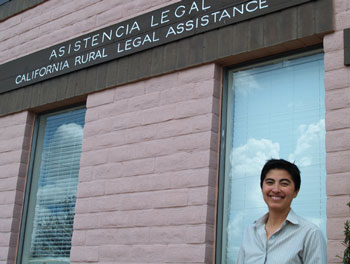 Having been a senior editor at the California Law Review, a judicial extern in federal court, and a winner of Berkeley Law’s Francine Diaz Memorial Award for outstanding community service, Lisa Cisneros ’07 had no shortage of lucrative job offers.
Having been a senior editor at the California Law Review, a judicial extern in federal court, and a winner of Berkeley Law’s Francine Diaz Memorial Award for outstanding community service, Lisa Cisneros ’07 had no shortage of lucrative job offers.
But when she heard about a new program aimed at improving legal services for low-income lesbian, gay, bisexual and transgender (LGBT) residents of rural California, plans changed. Cisneros returned home to Salinas—a heavily Latino farming area two hours south of San Francisco—to coordinate Proyecto Poderoso (Project Powerful). It felt like the lead role of this joint initiative, cosponsored by the National Center for Lesbian Rights (NCLR) and California Rural Legal Assistance (CRLA), was written for her.
“I grew up in Salinas, I came out as a teenager here, I come from a Mexican-American family and I speak Spanish,” Cisneros says. “All of that pushed me to take on this challenge. To help deliver much-needed services that had never been offered in this area, I wanted to be part of that.”
With recent pro-gay and transgender workplace legislation sparking more anti-discrimination and harassment cases, Proyecto Poderoso was launched to help the growing number of LGBT people in rural areas. According to Cisneros, the most common workplace problems are verbal abuse, less pay for identical work, and threats or acts of violence.
CRLA decided to expand their services for LGBT people after a series of cases in which workers were targeted for being gay or too effeminate. In one such case, a foreman had worked without problems for three years at a produce packing plant until he transitioned to become a woman, Sandra. The consequences were alarming and ultimately illegal: Sandra’s salaried pay was cut to an hourly rate, she endured verbal abuse, and when her partner who worked at the same plant was attacked by a co-worker, the company failed to discipline the co-worker—and demoted Sandra. With CRLA’s help, Sandra and her partner eventually reached a settlement with the company.
Protecting Rights, Raising Awareness
Cisneros consults with CRLA and NCLR lawyers about potential violations of antidiscrimination law, and raises awareness of LGBT rights in Salinas and other rural communities through the state. She spends half of her time educating CRLA’s large staff and community members, including many farm workers and local media, about LGBT issues. The other half is spent working on her growing caseload.
“We point to the law to explain our rights,” Cisneros says. “But we also try to show that we deserve respect because we are human beings. LGBT people deserve safe housing, and to feel secure at school and at work, just like everyone else.”
While more people in rural areas are coming out, they are often more isolated and less knowledgeable about their rights and available services. As Cisneros points out, the laws themselves are insufficient if LGBT residents lack access to legal assistance—and if employers are not held accountable. But even though her program is “often preaching to the non-choir,” Cisneros has seen preconceptions begin to fade.
“There’s an assumption that Latino communities are socially very conservative and that religious faith will automatically make the communities and families hostile to LGBT people,” she says. “But the reality is more complicated. A family may not wholeheartedly embrace someone coming out, but rarely do they outright reject a son or daughter. Often the families want to learn more about it all means. This can be tough when there is little information, people feel ashamed to ask, and no one is stepping forward to raise the issue.”
A Cultural Shift
A recent Williams Institute analysis of the gay, lesbian and bisexual (GLB) population in counties served by CRLA revealed that roughly 136,000 GLB people live in these mostly rural counties. Between 2000 and 2006, the number of same-sex couples in these counties increased 27 percent.
Cisneros believes this data indicates a rapidly changing culture and helps to quash common stereotypes about gay people as mostly male, white, wealthy and living in urban centers. The poverty rate among GLB people in counties served by CRLA (31 percent) is about equal to that of their heterosexual counterparts (33 percent). Unemployment rates and health indicators are worse for GLB people in these rural counties, and same-sex couples there are more likely to be Latino and raise children than same-sex couples statewide.
The statistics paint a picture of the communities CRLA, NCLR and Cisneros—who will return for a second year leading Proyecto Poderoso—are trying to reach.
“I don’t see my advocacy as limited to legal representation,” she says. “It’s also about putting a human face on the experiences of LGBT people.”
— By Andrew Cohen